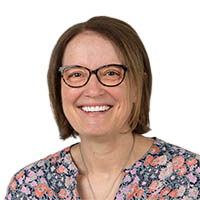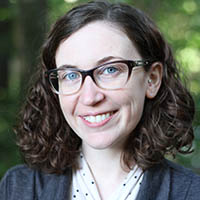Opioid learning collaborative continues to pay big dividends from $60,000 grant
From expanded field placements to better prepared students – and ultimately graduates – to a digital resource repository, Karen Chartier, Ph.D., can check off a number of outcomes that will extend the life of a modest one-year grant of $60,000.

The VCU School of Social Work associate professor was a co-principal investigator for the Social Workers on the Frontline of the Opioid Epidemic Learning Collaborative, a grant program from the National Council for Mental Wellbeing that funded 10 universities in early 2020. At VCU, the initiative supported the school in revamping an existing substance use interventions course, the development of a new prevention-focused course, the creation of two new field placement sites and a $5,600 stipend for each of seven participating master’s students during the 2020-21 academic year.
“I think what is exciting about this one-year project is that you can point to long-lasting effects that came out of it,” Chartier says. “We have been able to expand the focus on substance misuse in the M.S.W. curriculum, and there’s some continuing talk on how to build on that. It has resulted in resources that are available for faculty, alumni and our field partners, as well as these amazing students who are continuing to work in related areas.
“So I think that’s been really exciting, and I would also say it created these nice collaborations with other social work schools across the country. Faculty are continuing to talk, continuing to collaborate and share ideas that would have never existed, really, without this program.”
The resources Chartier references are a host of materials from participating faculty, aggregated as the online repository Building Capacity in the Workforce: A Focus on Substance Use Education. She contributed a faculty curriculum and assignments guide and a field practicum activity list. The materials are not relevant just for academics, though.
“Some are learning materials that you would incorporate into teaching or field projects, but others are really materials like webinars that sit as part of the library and are available for anyone to watch and learn more about the current state of research and information for working with people experiencing substance misuse,” Chartier says.
The development of the two new field sites for the project – one in rural western Virginia and the other nearby at VCU’s OB MOTIVATE Clinic in Richmond – was valuable both in the short and long term. The School of Social Work is continually working to place students for their required field internships, and has seen an increase because of growing enrollment and the development of the online option for the M.S.W. Program.
“It’s tricky finding field placements for students, particularly in more rural parts of the state,” Chartier says. “These two field placements are really brand new as a result of this project. The Office of Field Education was a great partner and deserves kudos for all of their work.”

Alum Kalie Owen (M.S.W.’21/SW) was one of the seven participating students and the one whose field placement was at the OB MOTIVATE Clinic, which treats women with substance use disorders during and after pregnancy.
“I had a wonderful experience working with the OB MOTIVATE team at VCU Health,” Owen says. “I was able to work closely with an interdisciplinary team comprised of doctors, nurses, social workers, researchers and psychology students who all had the goal of helping pregnant and postpartum women experiencing a substance use disorder. The OB MOTIVATE team created a compassionate, nonjudgmental environment to provide women with quality healthcare that incorporated mental healthcare as well.
“I became interested in being a part of the opioid collaborative because I saw a need for qualified social workers working with communities experiencing opioid use disorder in Richmond. I used to work as a case manager for Richmond CASA [Stop Child Abuse Now] and would see petitions for children to be removed from their families due to ongoing substance use challenges. I wanted to join the collaborative to learn more about substance use disorder in order to be able to help my community and build stronger families.”
Owen is a substance abuse counselor at Pinnacle Treatment Centers in Richmond. “Every day I am able to apply what I learned in school, through the collaborative and at OB MOTIVATE to help serve my clients,” she says. “I am a more knowledgeable and more empathetic counselor because of my participation in the opioid collaborative.”
Other participants in the opioid collaborative were:
- Christina Carter (M.S.W.’21/SW), Chesterfield County Mental Health Support and Thriveworks
- Daniella Dworschak (M.S.W.’21/SW), VCU Counseling Services
- Omid Garzan (B.S.W.’20/SW; M.S.W.’21/SW), VCU Health
- Kimberly Hackenberg (M.S.W.’21/SW), Centra Health’s Bridges Treatment Center
- Kathryn Johnson, currently enrolled in M.S.W. Program
- Ruby Tippl (B.S.W.’20/SW; M.S.W’21/SW)